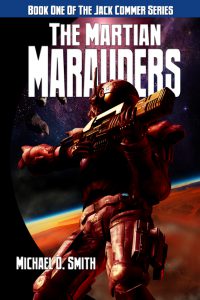The Martian Marauders, Now Digitally Remastered for Your Enjoyment
 The republished The Martian Marauders, Book One of the Jack Commer, Supreme Commander series, is now available from Sortmind Press.
The republished The Martian Marauders, Book One of the Jack Commer, Supreme Commander series, is now available from Sortmind Press.
Amazon paperback
Amazon eBook (Kindle format)
Smashwords eBook (multiple formats)
After the sale this year of the original publisher, I’ve decided to republish all six books in the series and add a new seventh book. All are receiving error corrections and fresh editing, especially the first three. But in all cases these are stylistic corrections; there are no changes to any of the stories, any aspects of their plots, and none of their characters.
What I’ve done with The Martian Marauders is like a modern digital clean-up of something like the 1960’s Star Trek series. You could decide to watch the original faded color shows … or you could opt for the digitally remastered, much more exquisite experience.
So The Martian Marauders is definitely digitally remastered. I really did use amazing modern word processing tech on this project!
I’m also compressing the first thirteen years of the series’ chronology to five, which mostly affects the first and third books. But aside from changing a few things people say and some explanations to make all six novels in the series congruent, the chronology edits also don’t structurally alter the books.
Condensing the timeline also feeds into the intriguing idea of how we might react to some overwhelming near-future catastrophe, in this case an inexplicable breakdown of the solar system, and how we might come up with some unheard of rescue technology by the end of the 2020’s. Though our scattershot response to COVID doesn’t really encourage much optimism, nevertheless, when faced such a series of existential astronomical disasters, wouldn’t we ramp up our science and engineering in an astonishing hurry, just as two twentieth century world wars, as well as the Cold War, brought quick, fantastic technological development?
I sanitized old formatting in The Martian Marauders manuscript by using what Smashwords calls “the nuclear option,” i.e., saving the entire text to Notepad, then copying and pasting to Word, stripping all formatting and styles. This results in extremely clean text. While I think most authors would gulp at so drastic a solution, I finally realized that the Word formatting in the first three books had been riddled with underlying formatting complications. I’ve since learned to use Word styles more efficiently.
So after nuclear war on The Martian Marauders, I had to thoughtfully decide what I wanted included as far as italics and italicized thinking went–very little as compared to the first version.
I marvel at the new polish and readability I’m able to impart throughout. Especially worthwhile is a heightened awareness of word choice, and grappling with the mortifying psychic shadow of typos and conceptual errors. I forced myself to thoroughly reread any new edit, as many of my worst errors have come from fast editing that passes spellcheck but leaves a few deleted words hanging around the paragraph. It is awful to again and again stumble across correctly spelled phrases which were obviously mangled in editing, or incorrect words you’ve glossed over a hundred times, like:
They were going they to the spaceport.
Yes, there was something to this being quiet and taking in all in.
Jack sighed. “Fine, John. Let’s go ahead and patch it though us so we can all hear it.”
Somehow grammar check doesn’t catch most of these. And it’s so easy to read that paragraph over and over and over through the years and never catch it, along with editors and readers. I had been so sure when the book was originally published in 2012 by Double Dragon Publishing that it was perfect and contained no errors at all.
 Republishing also sparked the urge to design a Sortmind Press logo based on a crop of a 2009 painting which I’ve used for Sortmind Press, and, as any avid reader of this blog will note, is also cropped for the blog header image. The new logo wound up on the back cover of the paperback.
Republishing also sparked the urge to design a Sortmind Press logo based on a crop of a 2009 painting which I’ve used for Sortmind Press, and, as any avid reader of this blog will note, is also cropped for the blog header image. The new logo wound up on the back cover of the paperback.
New work on The Martian Marauders has been a psychic gift. I feel the book is no longer something I finished in the past according to my talents of the time, but a piece of writing that reverberates with present consciousness. I feel quite energized again about digitally remastering the whole series. I’m getting the books the way I want them. I feel that I’m finally bringing out the real stories–which, paradoxically, have always been there. Yes, it’s space opera in one sense, but I’ve also explored a lot of my literary territory here.
I boggle at the rough page and word count totals for the series, the first book done, the rest undergoing edits:
| The Martian Marauders | 383 | 97,434 |
| Jack Commer, Supreme Commander | 198 | 58,608 |
| Nonprofit Chronowar | 272 | 74,941 |
| Collapse and Delusion | 228 | 59,124 |
| The Wounded Frontier | 319 | 84,368 |
| The SolGrid Rebellion | 333 | 90,136 |
| Balloon Ship Armageddon | 277 | 70,626 |
| 2,010 | 535,237 |
Two thousand pages. Half a million words. It never seemed like that much when I was writing them one by one.
This is the first time I’ve seriously considered, now that I fully own the publishing process on the series, that I really don’t have to end with Balloon Ship Armageddon, Book Seven, originally envisioned as the last book in the series. I’m free to go in any direction. Although there are some problems here, since Seven posits, and the unwritten Eight calls for, Jack literally saving the entire universe. What would be left for a Nine?
From the opening of The Martian Marauders:
The five hundred-mile-wide crater had been thoroughly radar-mapped, though nobody had ever seen it. They all knew the ground was still burning eight months later. Copilot Joe Commer looked away. All he could picture was the red-orange lava beneath all that soot.
“You know, I still can’t believe it,” he muttered. “Those were the Himalayas.”
His older brother Jack shrugged from the command seat to his left. “Are the sensors deployed?”
Joe took a breath. “Yep, they’re out. All five up and running. No problems.” Far to starboard hung the icy white fragments of the moon, beginning its eons-long spread into a complete ring. Joe listened to the whirring of the ventilation fans and the beeps of the electronics. The Control Room of the Typhoon I was brilliantly lit, and the reflections of its interior curved through the cockpit window, obscuring the line of twilight on the ruined planet below.
It was the first run where they hadn’t come to pick up a passenger shell. Nothing to do but drop off a few sensor satellites. Nobody else to rescue, nobody who wanted to be rescued. They were really saying goodbye.
Joe shuddered at the charcoal blanketing most of the planet. He could all but smell the death below. How could he ever have lived there?
The United System had declared June 5th the final day for mandatory evacuation, and three days ago the USS Celeste had picked up four hundred refugees, all against their will. There were only handfuls of human beings left down there anyway, all doomed, but they’d made their choice. What good did it do anymore to send USSF troops into the refugee camps, taking casualties fighting the diehards, just so they could haul a few survivors back?
Copyright 2020 by Michael D. Smith

Comments
The Martian Marauders, Now Digitally Remastered for Your Enjoyment — No Comments
HTML tags allowed in your comment: <a href="" title=""> <abbr title=""> <acronym title=""> <b> <blockquote cite=""> <cite> <code> <del datetime=""> <em> <i> <q cite=""> <s> <strike> <strong>